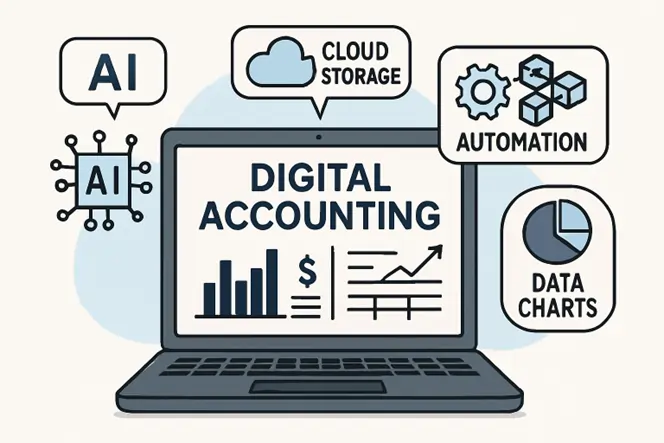Table of Contents
ToggleThe world of accounting is undergoing a technological revolution that streamlines processes, enhances accuracy, and generates new insights for businesses of all sizes. In today’s competitive market, innovations in accounting practices are essential for both operational efficiency and strategic growth. Companies are now increasingly relying on advanced solutions, such as artificial intelligence, cloud platforms, and blockchain, to gain an edge in managing financial operations and compliance. For many, leveraging accounting outsourcing in the USA is a crucial step in harnessing these tools to remain agile and compliant with evolving industry standards.
This digital transformation not only accelerates day-to-day tasks but also enables more in-depth financial analysis and informed decision-making. Accountants can now spend less time on repetitive activities and more time serving as trusted business advisors. The ability to access and interpret clean, up-to-date financial data has never been more important, and technology provides the foundation for this new value-driven approach. As a result, businesses can adapt faster and respond more effectively to changing market conditions while maintaining strict regulatory compliance.
Artificial Intelligence in Accounting
Artificial intelligence (AI) is a key driver in the modernization of accounting. AI-powered software can learn from historical data, categorize transactions, identify potential fraud, and forecast financial outcomes with remarkable accuracy. Unlike traditional tools, AI adapts over time, continuously enhancing its predictions and analytics. Tools such as predictive analytics and natural language processing allow accountants to sift through massive datasets at lightning speed, surfacing actionable insights for financial planning and compliance initiatives. According to Harvard Business Review, leading firms have reduced process times and increased accuracy by integrating AI in auditing and bookkeeping, indicating a shift from manual reviews to tech-augmented validations.
Automation: Streamlining Tasks
The emergence of automation in accounting has revolutionized how firms handle routine and time-intensive operations. With solutions for automated data entry, reconciliations, and invoice management, firms can virtually eliminate human error from tedious processes. Automated payroll, expense matching, and bank statement processing enable accountants to focus on more complex financial analyses and scenario planning. For example, what once took hours of manual work now happens in real-time, thanks to automated syncing between financial institutions and accounting platforms. This efficiency not only saves valuable time but also provides transparency, enabling better compliance tracking and reporting.
Cloud Computing: Enhancing Accessibility
Cloud technology has revolutionized financial management by providing accountants and business owners with on-demand access to their data from anywhere in the world. Solutions like QuickBooks Online and Xero enable real-time collaboration, reduce reliance on single-location servers, and provide enhanced data security through automatic backups and robust permission controls. Cloud-based tools are highly scalable, adapting to the dynamic needs of growing businesses and supporting hybrid or fully remote working environments. The scalability, flexibility, and cost-effectiveness of cloud platforms have established them as an essential component in modern accounting. For further exploration, CFO.com outlines best practices for leaders implementing cloud accounting solutions.
Blockchain: Ensuring Transparency
Blockchain technology provides a secure and immutable ledger for recording transactions, disrupting traditional methods of maintaining financial records. In accounting, blockchain is particularly useful for tracking the lifecycle of transactions, maintaining audit trails, and verifying data. Its decentralized nature ensures that once data is recorded, it cannot be retroactively altered or tampered with, which greatly reduces instances of fraud and strengthens audit integrity. Leading firms are already piloting blockchain for streamlining complex reconciliations and multi-party transactions.
Data Analytics: Informing Decisions
Modern accounting relies on advanced data analytics to derive patterns and actionable insights from vast troves of structured and unstructured data. Predictive analytics enables firms to identify trends and develop proactive strategies, enabling clients to manage risk and make informed investment decisions. Visualization tools and dashboards make complex financial information more accessible to clients and stakeholders, empowering more strategic conversations and transparent reporting. Integrating machine learning with analytics tools ensures continual improvement in identifying anomalies, forecasting budgets, and supporting decision-making.
Cybersecurity: Safeguarding Data
As digital transformation accelerates, so does the need for enhanced cybersecurity. Accounting firms must protect sensitive financial records against a rising tide of cyber threats—ransomware, phishing, and data breaches rank among the most common risks. By implementing layered security measures such as encryption, two-factor authentication, and regular cybersecurity training, firms can significantly reduce their vulnerability. Staying ahead of evolving threats and adhering to best cybersecurity practices is crucial for maintaining client trust and ensuring regulatory compliance.
Emerging Technologies in Accounting
Beyond the widely adopted practices of AI and blockchain, emerging technologies promise to reshape the accounting sector further. Quantum computing, for instance, has the potential to process and analyze financial data at unprecedented speeds, thereby optimizing complex financial modeling and facilitating real-time risk assessments. Robotic process automation (RPA) and advanced machine learning further enable automated, data-driven decision-making. Firms investing in these next-generation technologies will be well-positioned to provide deeper value and future-proof their services amid ongoing innovation.
Conclusion
The accelerated adoption of advanced technologies within accounting marks a pivotal shift towards data-driven, efficient, and highly transparent practices. By incorporating AI, automation, cloud computing, blockchain, and data analytics, accounting firms are better equipped to navigate compliance, enhance client service, and deliver strategic value in a rapidly evolving business environment. Embracing these tools is crucial for maintaining a competitive edge and providing consistently reliable financial insights.
Read more: How to Strengthen Endpoint Security Across Your Organization
Understanding Polish Citizenship by Descent: A Comprehensive Guide
SASSA Status Check: Your Complete Guide to Tracking Payments and Application Updates in South Africa

